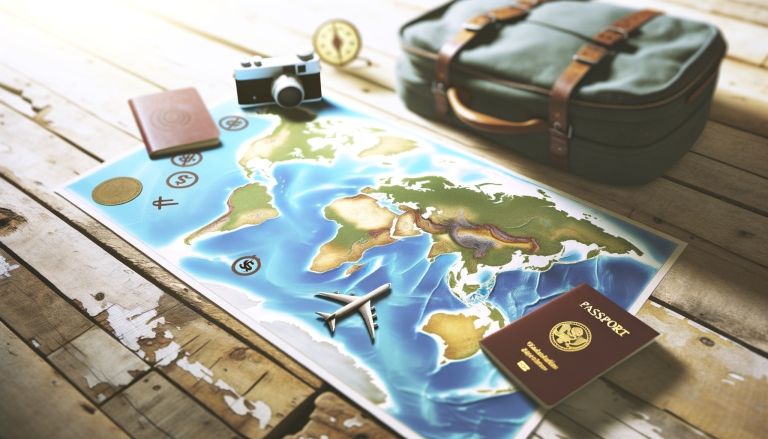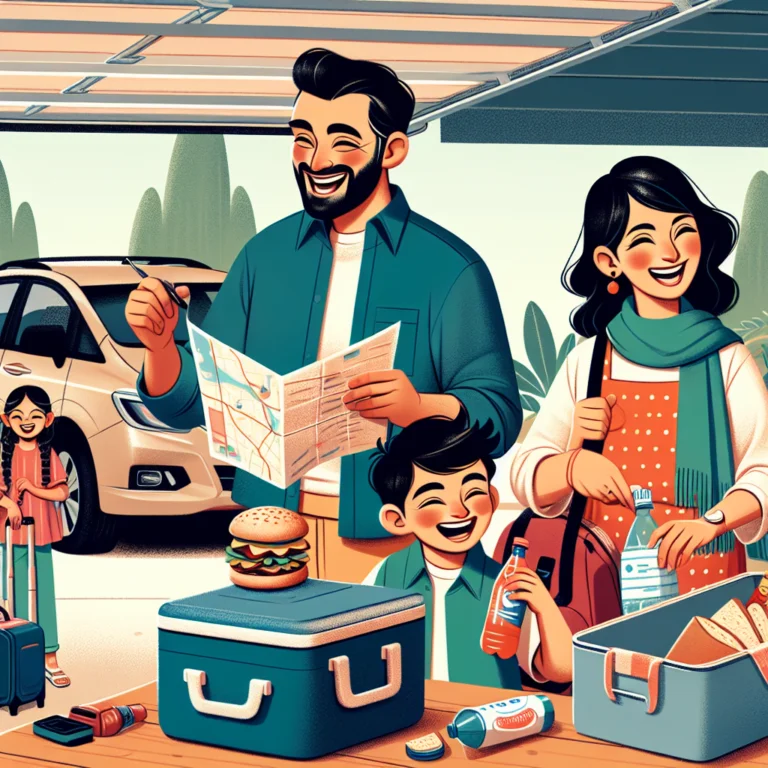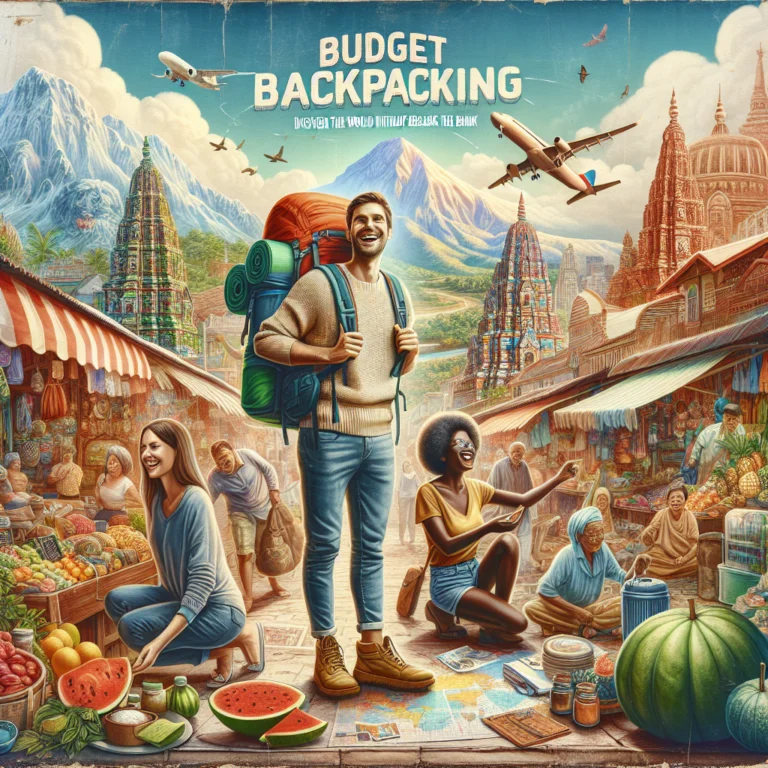Traveling On A Shoestring: Top Tips For Ultra-Budget Travel
Looking to travel on a shoestring budget? Look no further! In this article, we’ll provide you with the top tips for ultra-budget travel. From finding the best deals on flights and accommodations to making the most out of your money while exploring new destinations, we’ve got you covered. Whether you’re a college student looking for an adventure or a budget-conscious traveler, these tips will help you make your travel dreams a reality without breaking the bank. So grab your passport and get ready to embark on an incredible journey without spending a fortune.
Planning Your Budget Travel
Planning a budget travel requires careful research and preparation. It’s important to start by doing a thorough research on the destinations you are interested in. Look for travel blogs, websites, and forums where fellow travelers share their experiences and suggestions for affordable places to visit.
Once you have an idea of the destinations you want to explore, it’s time to set your budget. Determine how much you can comfortably spend on your trip and allocate separate budgets for accommodation, transportation, food, activities, and any other expenses. This will help you stay on track and avoid unnecessary costs.
Next, prepare a detailed travel itinerary. Research the attractions, landmarks, and activities available at each destination and map out your daily plans. Having a well-planned itinerary will not only ensure that you make the most of your time, but also help you estimate the costs associated with each activity.
Lastly, consider booking your accommodations and activities in advance. This can help you secure better deals and reduce the chances of last-minute price hikes. Look for websites or apps that offer discounted rates and flexible cancellation policies, so you can make changes if needed without incurring additional fees.
Choosing Affordable Destinations
Choosing affordable destinations is key to successful budget travel. Look for countries or cities that offer a lower cost of living compared to your home country. Southeast Asia, Eastern Europe, and parts of South America are known for being budget-friendly destinations with affordable accommodations, food, and transportation.
When comparing the cost of living between destinations, take into account factors such as accommodation prices, food and drink costs, transportation expenses, and the availability of free or low-cost attractions. Consider creating a spreadsheet or using budgeting apps to compare and track costs for different destinations.
Furthermore, consider traveling during off-peak seasons. Prices for flights, accommodations, and attractions tend to be significantly lower during the shoulder seasons or when tourist numbers are low. Not only will you save money, but you’ll also have a more authentic and less crowded experience.
Booking Cheap Flights
Finding the best flight deals is crucial for budget travel. Start by using flight search engines and websites that allow you to compare prices across multiple airlines. Be flexible with your travel dates and consider flying on weekdays or during less popular times, as these flights are often cheaper.
Consider booking with budget airlines, which tend to offer lower fares compared to full-service airlines. However, keep in mind that budget airlines may charge extra fees for baggage, seat selection, and other services, so be sure to factor in these additional costs when comparing prices.
Subscribe to flight alerts from various websites and airlines. These alerts will notify you when prices drop or when special promotions are available. By being proactive and staying informed, you can snag great deals on flights.
Lastly, don’t forget to be flexible with your travel dates. If you have the flexibility to travel during weekdays or shoulder seasons, you’ll have better chances of finding cheaper flights. Use search engines that allow you to view prices for different dates at a glance, so you can choose the most cost-effective options.
Saving on Accommodations
Choosing budget lodgings is a major money-saving strategy for budget travelers. Consider staying in hostels, guesthouses, or budget hotels instead of luxury resorts. These accommodations offer basic amenities at a fraction of the cost and provide opportunities to meet fellow travelers.
Another option is to consider homestays or guesthouses. These options give you the chance to stay with locals and experience their everyday life. In addition to being more affordable, homestays often provide unique cultural experiences and insights into local traditions.
When booking accommodations, make use of booking sites that offer the best deals. Websites like Booking.com, Agoda, and Hostelworld provide a wide range of options at discounted rates. Some even offer loyalty programs that allow you to accumulate points for future discounts.
If you’re up for an adventure, consider trying a work exchange. Platforms like Workaway and HelpX allow you to volunteer in exchange for accommodation and sometimes meals. This is a great way to immerse yourself in the local culture, make a positive impact, and save money on accommodations at the same time.
Saving on Local Transportation
Savvy budget travelers know how to save on local transportation costs. Instead of relying solely on taxis or car rentals, utilize public transportation options such as buses, trains, and metros. Public transportation is not only cheaper but also gives you the opportunity to experience the local lifestyle.
Another option is to use shared rides like Uber or Lyft, or opt for ride-sharing services like BlaBlaCar, which connects drivers and passengers traveling in the same direction. By sharing the costs, you can significantly reduce transportation expenses.
In cities with bike-friendly infrastructure, renting bicycles or scooters can be a cost-effective and fun way to get around. Many cities now have bike-sharing programs or rental shops where you can rent bicycles or scooters for short periods.
Do some research on transportation cards or passes available in the destination you are visiting. These cards often offer unlimited rides in a specific area or across different modes of transportation. They can save you money, especially if you plan on using public transportation frequently during your stay.
Saving on Food Expenses
Food expenses can quickly add up during a trip, but there are ways to save money without compromising on the quality of your meals. One of the most effective ways to save on food is by cooking your own meals. Look for accommodations with kitchen facilities or book hostel dorms with shared kitchens. Visit local grocery stores or markets to buy ingredients and cook simple, budget-friendly meals.
Another option is to eat at local markets or food stalls. Street food is often delicious, authentic, and significantly cheaper than eating at restaurants. Be sure to choose vendors with good hygiene practices and always consider the local recommendations for safe and tasty street food options.
Pack snacks for long days of exploring. Having some granola bars, fruit, or nuts in your bag can help you avoid expensive food stalls or tourist traps when hunger strikes. Plus, it’s always good to have some backup snacks in case you end up in a location with limited food options.
Avoid restaurants located in touristy areas, as they tend to be more expensive. Instead, venture off the beaten path and look for local eateries frequented by locals. Not only will you save money, but you’ll also get to experience the authentic local cuisine.
Free and Low-cost Attractions
There are countless free and low-cost attractions to explore in every destination. Before your trip, research the free attractions available in the cities or countries you plan to visit. Museums, parks, historic sites, and cultural centers often have designated free entry days or specific time slots when admission is waived.
Consider purchasing city tourist cards, which provide discounted or free access to multiple attractions, public transportation, and other perks. These cards are usually available for a fixed duration and can save you money if you plan on visiting multiple paid attractions.
Join walking tours organized by local guides or universities. These tours are often free or tip-based, allowing you to explore the city’s highlights while learning about its history, culture, and hidden gems. It’s also a great way to meet fellow travelers and exchange valuable travel insights.
Take advantage of outdoor activities and nature visits, as they are often free or have minimal costs. Hiking, swimming, picnicking, and exploring local parks or beaches can be a great way to experience the natural beauty of a destination without breaking the bank.
Practical Shopping Tips
When it comes to shopping while traveling on a budget, there are some practical tips to keep in mind. Avoid touristy shops located in heavily touristed areas, as they tend to mark up prices. Instead, explore local markets and shops to find unique souvenirs and products at more reasonable prices.
Bargaining is a common practice in many countries, so don’t be afraid to negotiate prices, especially in markets or with street vendors. However, be respectful and mindful of local customs and always remember that the goal is to reach a fair and mutually beneficial price.
Consider buying souvenirs at local supermarkets or grocery stores instead of tourist shops. You can find local snacks, spices, or even traditional craft items at lower prices. Plus, buying from supermarkets supports the local economy and ensures that your money goes directly to the community.
Avoid unnecessary shopping and impulse purchases. Before buying something, ask yourself if it is truly essential or if it will add value to your travel experience. Focus on collecting memories and experiences rather than accumulating material possessions.
Travel Insurance for Budget Travelers
Travel insurance is essential for all travelers, including those on a budget. It provides financial protection in case of unforeseen events such as medical emergencies, trip cancellations, or lost luggage. Even with careful planning, accidents can happen, and having travel insurance can save you from significant financial burdens.
When looking for travel insurance as a budget traveler, compare and shop around for the best deals. Consider factors such as coverage limits, deductible amounts, and exclusions. Read reviews and check the reputation of insurance providers to ensure they have a good track record of customer service and claims handling.
Read the fine print of the policy carefully to understand what is covered and what is not. Pay attention to terms and conditions, claim procedures, and any limitations or exclusions. Be aware of any pre-existing medical conditions and disclose them to the insurance provider to ensure you have proper coverage.
Mistakes to Avoid in Budget Travel
While budget travel can be rewarding, there are some common mistakes to avoid to ensure a smooth and enjoyable experience. Firstly, be cautious of tourist scams. Research common scams in the destination you are visiting, be vigilant, and avoid situations that seem suspicious or too good to be true.
Avoid overpacking, as it can lead to additional baggage fees and inconvenience during your trip. Pack light and bring only essentials. Consider clothing items that can be mixed and matched, and opt for versatile accessories instead of multiple bulky items.
Always check visa and vaccination requirements before traveling to a new country. Failure to do so can result in additional costs or denial of entry. Research the entry requirements, including visa application fees and processing times, and make sure you have the necessary vaccinations well in advance.
Lastly, don’t underestimate the budget needed for your trip. It’s better to overestimate expenses and have some extra funds, rather than running out of money while you’re still on your journey. Create a cushion in your budget for unexpected expenses or emergencies, so you can enjoy your trip without worrying about financial constraints.
In conclusion, by doing thorough research, setting a budget, carefully planning your itinerary, and employing money-saving strategies, you can enjoy a fulfilling and budget-friendly travel experience. Remember to be flexible, seek out affordable destinations, make wise choices when it comes to flights, accommodations, transportation, food, and attractions, and always prioritize travel insurance for your peace of mind. By avoiding common mistakes and staying on top of your budget, you can create wonderful memories without breaking the bank. Happy travels!







